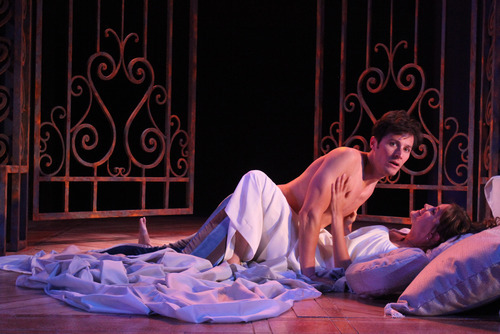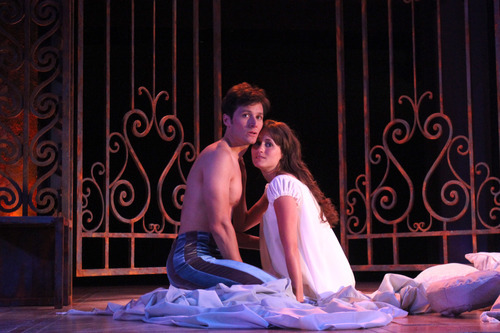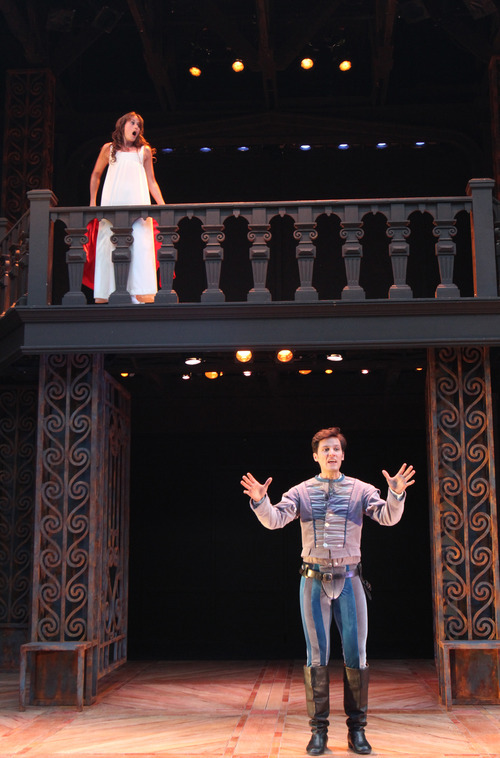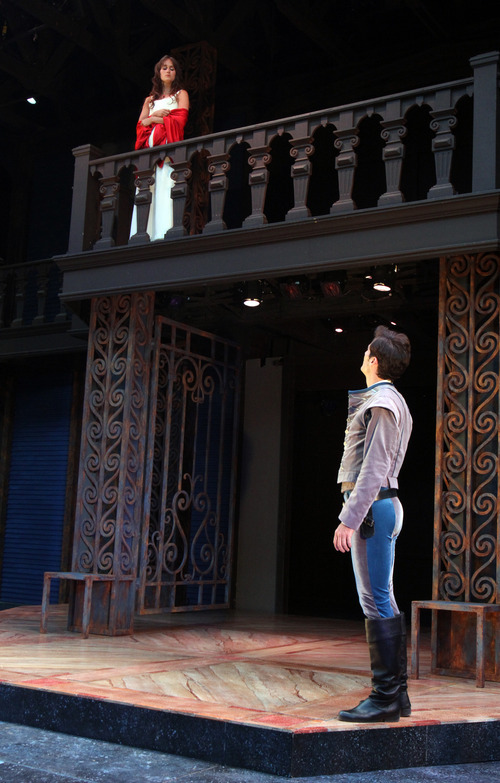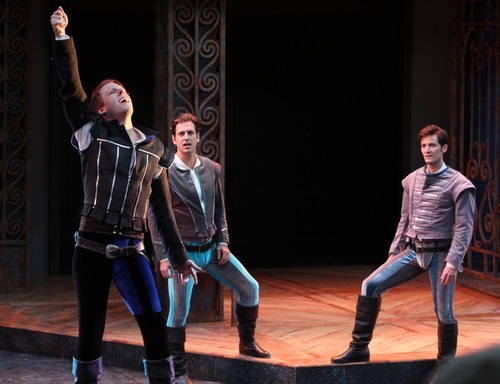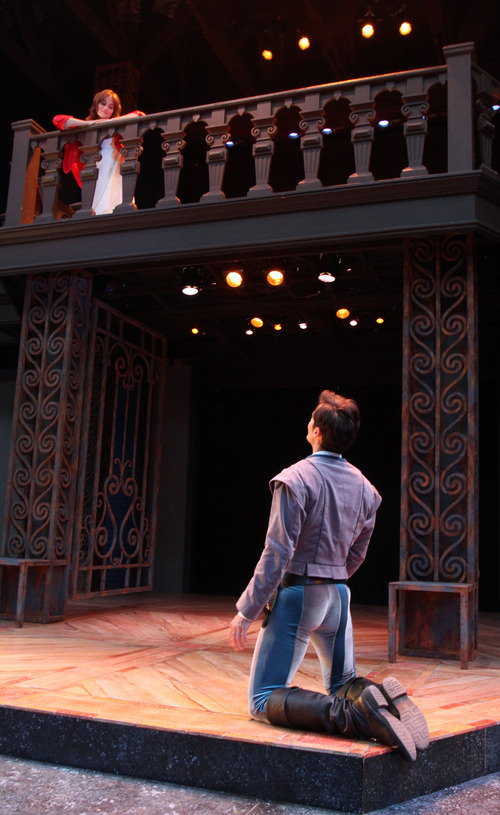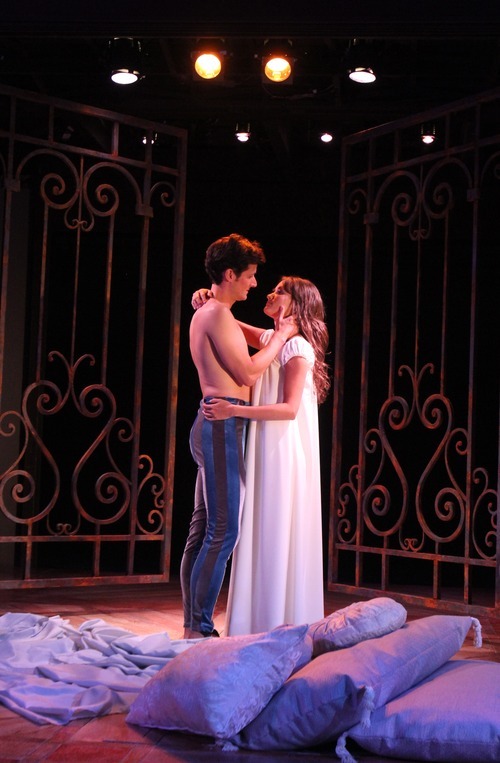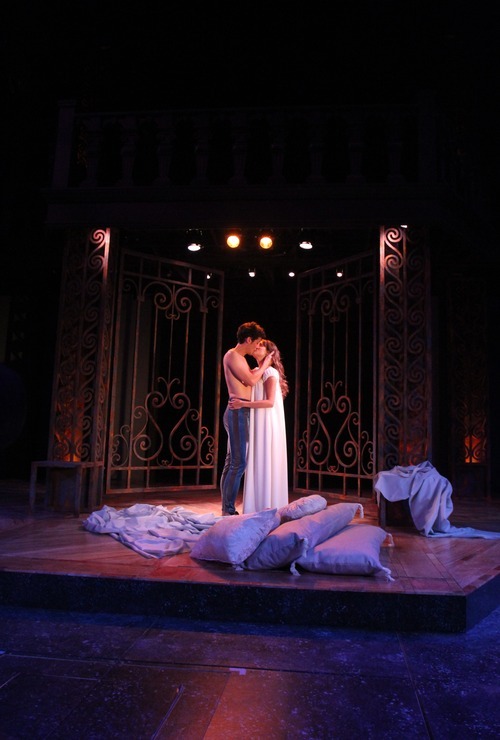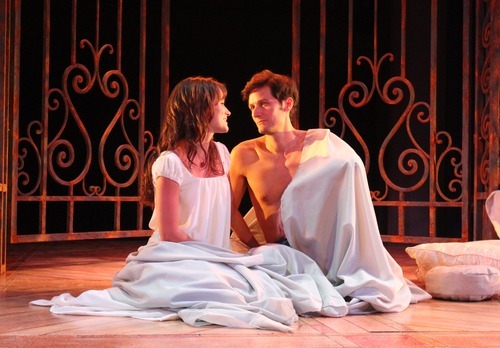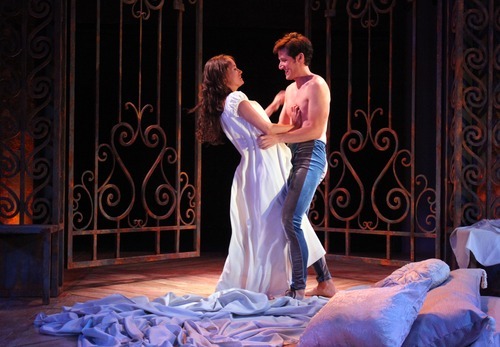This is an archived article that was published on sltrib.com in 2011, and information in the article may be outdated. It is provided only for personal research purposes and may not be reprinted.
Cedar City had a little trouble in the early 1960s. That's properly spelled with a capital "T," that rhymes with "B," which stands for "Bypass."
Business owners worried that the proposed Interstate 15 would divert the stream of tourists who annually opened their wallets in Cedar City as they drove through town toward Zion and Bryce Canyon national parks. The area's mining industry was petering out around the same time, and Cedar City's future looked bleak.
Enter Fred C. Adams and Barbara Gaddie Adams. He was a young professor with big dreams about how a theater festival might inspire passing tourists to exit the freeway to see a show or two in Cedar City.
Fred Adams spent time studying the successful Oregon Shakespeare Festival in Ashland, then set about creating his own version on the campus of College of Southern Utah, now Southern Utah University.
In 1962, townspeople and students built sets, props and costumes and presented three Shakespearean plays on an outdoor platform. The fledgling festival cleared $2,000 and solidified a spirit of cooperation between town and gown. Something miraculous was under way.
—
Like a genuine Harold Hill • Utah Shakespeare Festival has continued to grow in the past five decades. Now it's a year-round operation with an annual budget of more than $5 million, with annual attendance approaching 200,000. The company presents nine plays per year in repertory, housed in three theaters.
According to a 2002 survey, the theater company contributes $64 million to southwestern Utah's economy each year and is the chief contributor to Cedar City's identity as Festival City USA.
Adams is the only member of the current USF staff who remembers the festival's early days. "Most of my classmates are pushing up daisies," the sprightly octogenarian said.
Those who have seen him in action can well imagine how he pulled it off. Like "The Music Man's" Professor Harold Hill — the fictional con man who persuades a town of stubborn Iowans to buy into his scheme of creating a boys band — Adams knows how to sell an idea.
Unlike the underqualified and self-serving Hill, Adams is the genuine article. The native Utahn came to Cedar City with credits from the New York theater scene, plus bone-deep knowledge and passion for stagecraft.
Just as important, he brought his gift for treating everyone he meets as a treasured friend — a trait that has built immeasurable good will for the festival.
Adams stepped down from day-to-day operations as USF's executive producer in 2005, adding "emeritus" to his title. His wife, who for decades was the festival's music director, died in 2007. Yet he remains a tireless cheerleader for the festival, as well as a fundraiser for the expanded Shakespearean village that's his next big dream.
Two aspects of Adams' character have been essential to USF's success, said festival communications director Bruce Lee, who wrote a book celebrating the festival's first 50 years.
"There is Fred the visionary, who would become an icon — not just in the Intermountain West, but as a nationally renowned theater figure," Lee said. "But for those who know and work with him, Fred is a friend, a mentor and a teacher, down to earth and willing to help."
—
The color of King Tut's vomit • The 2011 season at USF is about many things — longevity, renewal and transformation among them. In many ways, it's also about Adams himself and the difference one person can make.
The golden-anniversary season is highlighted by touches of gold: from a willow tree in "A Midsummer Night's Dream" that shimmers with magical surprises to the aura of decaying gold that permeates the staging of "Richard III." Items for a lobby display of props, costumes and memorabilia were selected for their golden sparkle.
"You walk in, and you think King Tut vomited," Adams jokes before adding, ever the showman: "Actually, it's quite attractive."
More precious even than gold, as Adams tells it, is another celebratory exhibit: two Quartos (original editions of Shakespeare plays) and a priceless First Folio (the first printing of Shakespeare's works, without which many of his plays would be lost). The manuscripts, created circa 1600, are on loan from the Folger Shakespeare Library in Washington, D.C., and on display in SUU's Gerald R. Sherratt Library.
—
Turning 50 • The six plays of the 2011 summer season represent "a dream season," said USF co-artistic director Brian Vaughn. Shakespeare's "A Midsummer Night's Dream," "Romeo and Juliet" and "Richard III" were chosen through a survey of audience favorites, as was Michael Frayn's wacky farce "Noises Off!"
Adams is directing "Midsummer" himself, and favorite Utah actor Max Robinson, who plays the country bumpkin Bottom, gives him high marks. "Fred has a very sly sense of humor, and he knows his vaudeville," Robinson said. "He has such an eye for the overall picture, and he knows this audience so well, and what is going to work."
The poignant play "The Glass Menagerie" was selected to honor the birth centennial of the great American playwright Tennessee Williams. "We want to let people see that part of our mission is to keep alive the great writings of the Shakespeares of our world," Adams said.
And then there is the quintessential American musical, Meredith Willson's "The Music Man," with its story of a town that pulls together around Harold Hill's mission to form a band.
"It's wonderful how the arts can touch and change a community and the lives within it," Adams said of "Music Man."
What Adams won't say, Vaughn will: "That's what Fred did for Cedar City."
facebook.com/tribremix —
Utah Shakespeare turns 50
The Utah Shakespeare Festival presents its 50th-anniversary summer season of plays June 23 through Sept. 3 on the Southern Utah University campus in Cedar City.
Shakespeare classics • In the outdoor Adams Theatre: "A Midsummer Night's Dream," directed by Fred C. Adams; "Richard III," directed by Kathleen F. Conlin; and "Romeo and Juliet," directed by David Ivers.
Contemporary plays • In the indoor Randall L. Jones Theatre: Meredith Willson's "The Music Man," directed by Jeremy Mann; Tennessee Williams' "The Glass Menagerie," directed by J.R. Sullivan; and Michael Frayn's "Noises Off," directed by Jeff Steitzer. "Noises Off" will extend through the fall season, concluding Oct. 29.
Tickets • $22-$71; at 800-PLAYTIX or http://www.bard.org.
Also •The festival offers ticketed backstage tours and free daily literary and production seminars, play orientations and greenshows.


